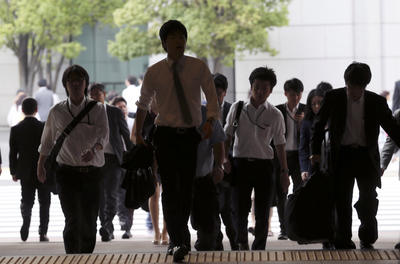Abe is a major proponent of lowering the corporate tax rate and was instrumental in passing legislation to cut corporate taxes from 38 to 35.6 per cent earlier this year. But, according to the IMF, unless the government lowers the tax rate to below 30 per cent the economic impact is negligible.
Proponents argue that lowering the tax rate will encourage domestic and foreign companies to invest in Japan. As of December, companies are hoarding a near record ¥222 trillion (US$2.17 trillion) and are looking abroad to make investments. Japanese companies increased their overseas investments to a record ¥69 trillion (US$676 billion) in the last quarter of 2013, up 40 per cent from 2012.
But foreign direct investment in Japan fell to ¥17.8 trillion (US$175 billion) in 2012 from the 2008 peak of ¥18.5 trillion (US$$187.2 billion). Direct investment in Japan is the lowest among OECD countries at 3.5 per cent of GDP. By lowering the tax rate, the government hopes to hit its target of doubling annual direct investment to ¥35 trillion (US$343 billion) by 2020.
Deputy Economy Minister Yasutoshi Nishimura believes lowering the corporate tax rate to below 30 per cent is key to increasing investment to Japan. ‘Japan needs more foreign direct investment and we want to do more to encourage corporations to invest here’, said Nishimura in a recent Bloomberg interview.
But don’t expect the Abe administration to lower the current rate below the 30 per cent threshold when corporate tax is cut on 1 April 2015. The government will likely lower the rate incrementally over a number of years, similar to how they increased the consumption tax.
The government also hasn’t decided how they will make up for the loss in revenue. Many policymakers are pushing for the government to lower the tax threshold for capital and salaries, which currently only applies to corporations with capital or investments exceeding ¥100 million (about US$1 million). Even among large corporations, less than half meet the threshold to pay any corporate income tax. In contrast, only 25 per cent of large US companies are ‘zero-payers’.
Widening the tax base will likely hurt smaller businesses that have benefited from not having to pay the steep corporate tax rate. But the Abe administration could avoid this by choosing a different style of tax reform, such as revising rules for carrying forward net operating losses, industry specific tax measures, dividend received deductions and asset depreciation.
But will lowering the corporate tax result in tangible economic growth?
Sceptics in the LDP argue lowering the tax rate won’t do much because most companies don’t pay the tax, and therefore will not be encouraged to spend more even if the rate falls 5 per cent.
A 1995 study by Michael Devereux and Harold Freeman also shows corporate tax rates have no influence on domestic spending. But the corporate tax rate does influence foreign direct investment. A similar study based on 11 OECD countries between the 1980s and 1990s found a ‘reduction of one percentage point in the corporate tax rate of a host country causes an increase of about 4 per cent in inbound foreign direct investment in that country’.
So will a corporate tax cut help increase foreign direct investment? Not necessarily. Language, corporate culture and outdated regulations are greater barriers than the high corporate tax rate.
One of the biggest barriers for foreign companies is what Shinji Fukukawa, former vice minister of the Ministry of International Trade and Industry, calls Japan’s ‘weak international awareness and adaptability’.He believes that the communication skills of Japanese people tend to be poor and that Japan is disadvantaged by low English proficiency rates — Japan ranks 148th out of 167 nations on the Test of English as a Foreign Language. He also notes foreign businesses often find it difficult to find Japanese workers to hire who have an international outlook. Because of this foreign companies tend to choose South Korea, Taiwan and Singapore as their investment destinations.
Another problem that hinders foreign direct investment is the closed and exclusive nature of commercial practices. Foreigners view this as a hard barrier to overcome when entering the market. Japanese companies tend to take a bottom-up approach to decision making, which can lead to delays and frustrated foreign partners.
The current regulatory climate is also difficult for foreign businesses. Foreign firms often complain about the strict regulations in sectors such as pharmaceuticals, medical care, automotive, electric power and services. Immigration rules also impede companies from bringing over necessary staff and personnel. Likewise, free trade agreements represent only 17.6 per cent of its overall trade, compared to 35.8 per cent in South Korea and 21.5 per cent in China. Removing non-tariff barriers and establishing free trade agreements with key allies would result in immediate gains in foreign direct investment.
Even if the Abe administration were to successfully lower the corporate tax rate by 5 per cent, there is very little likelihood it will translate into economic growth. Abe needs to create better incentives for both domestic and foreign companies to invest in Japan. Removing cumbersome regulations and concluding regional trade agreements are low-hanging fruits, while changing corporate culture and increasing English proficiency will be a long term challenge. In the meantime, the Abe government should work towards developing a robust and comprehensive growth strategy, and spend less time arguing about corporate taxes.
Stephen Stapczynski is a Public Affairs and Public Relations Associate at the Sumitomo Corporation and the author of the Izakaya Politics blog on Japanese politics and US–Japan relations.

